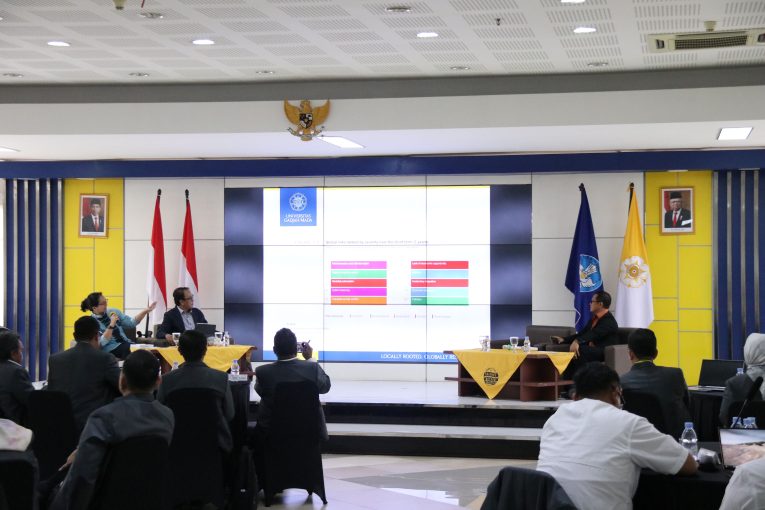
Yogyakarta, May 16th 2024─Indonesia has a strategic position in the eyes of the international community, both geographically and politically. The world is currently faced with challenges and changes, as well as uncertainty in the future. Understanding of geopolitics and public policy by the government will certainly determine the direction of Indonesia’s future movements. Carrying this urgency, Faculty of Social and Political Sciences UGM raised the theme of geopolitics and public policy in the National Leadership Training (PKN) Level I which was attended by ASN officials and their equivalent on Thursday (16/5).
“There are prerequisites when an issue can be said to be a common problem. The first is when the issue does not only occur in Indonesia. Both the cause and the handling must be handled together,” said Vice Dean for Academic and Student Affairs, Prof. Dr. Poppy Sulistyaning Winanti, M.P.P, M.Sc. Based on the survey she presented, some issues are still trending until now, including issues of misinformation, extreme weather or climate change, to the inadequacy of public infrastructure. According to Poppy, although these issues seem to be in different scopes, they can all cause one big and complicated problem if not handled properly.
However, Poppy also explained that globalization, which causes a borderless world, creates a space for liberalization. “We know there is a common problem, but on the other hand countries are also selfish. We face the same problem, but with unequal capabilities. This causes a large gap between countries,” he said. One example given is the issue of climate change.
Basically, climate change is created by human activities that are not considered sustainable. The carbon emissions generated in each country are different, as is the country’s ability to contribute to addressing climate change. Technology development in the United States and Europe is far more advanced than in Indonesia. Even an understanding of climate change itself is still not prioritized by the public.
“When we want to push a certain commodity, we will definitely do something that has an impact on the environment. Our interdependence is why we cannot stand alone as a country without collaboration,” said Poppy. Unfortunately, cooperation and collaboration between countries often lead to competition. Who controls what, and how will be the leader of the countries to achieve the goal. Therefore, the right policy is needed to respond to these obstacles.
In addition, another challenge in Indonesia is the difference in the ability of each region to carry out development. Doddy Aditya Iskandar, S.T., MCP, Ph.D, Lecturer of Architecture UGM explained the importance of understanding national needs and its relation to regional strategic solutions. “I see that we have to understand the problems that occur in the regions and how to create adaptive solutions. We in western Indonesia may be facilitated by technology, but not those in the center or east,” he said.
According to Doddy, local government is an important unit to find out the right policy for the development of the region. The quality and capability of the local government will be determined by the human resources of the region itself. This is what the government needs to pay close attention to in making policies. “Local governments in the Bojonegoro area have different capabilities from local governments in Madura, Flores, East Nusa Tenggara, for example. So it is important for the government to determine policies based on geography,” he explained.
The National Leadership Training (PKN) Level I with the State Administration Institute of the Republic of Indonesia (LAN RI) is a forum for academics to sit with the government to discuss the right strategy to build Indonesia in the future. The hope is that this event will not only provide training to ASN from state institutions, but also realize strong collaboration and cooperation between institutions, as stated in the 17th Sustainable Development Goal.
